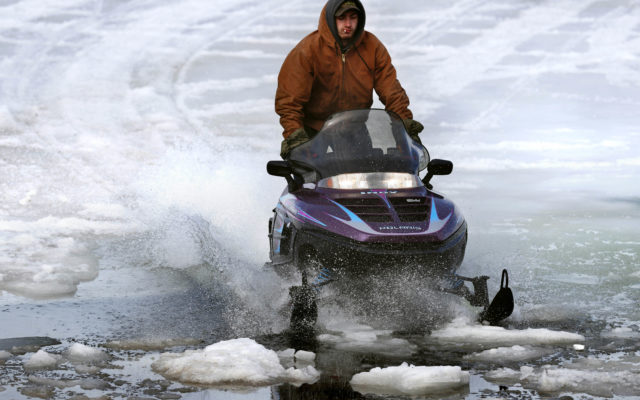
Answers to your questions about how climate change affects winter recreation in Maine
By Bill Trotter, Bangor Daily News Staff
Maine has long been a popular destination for outdoor enthusiasts who in winter have gone downhill skiing, snowmobiling, and ice fishing. But as climate change makes sub-freezing temperatures and sufficient snowpack less consistent, and as tourists seek out new kinds of experiences, traditional winter outdoor recreation businesses in Maine are having to adjust.
Some ski resorts have suffered through slow winters due to a relative lack of snow, while opportunities to go ice fishing are shrinking as lakes consistently freeze later and thaw earlier in the year.
To share information about the effect of warming temperatures on Maine’s economy, communities and ecosystems, the Bangor Daily News hosted an online event on Oct. 15, bringing together four experts to share their work on the topic. The webinar was the third of four BDN Climate Conversations, which will help shape our coverage of climate issues.
The conversations bring together scientists from the University of Maine and other research institutions as well as local subject matter experts.
During last week’s event, 48 people tuned in to find out more about the impact of warmer temperatures on winter recreational activities in Maine. Here are some of their biggest questions.
Michael San Filippo, Lynbrook, New York
Is it possible that climate change may, paradoxically, cause colder temperatures on average in Maine during the winter in the future? Rising temperatures are weakening the jet stream, allowing frigid arctic air to reach further south.
While climate change has made weather conditions more volatile, the overall trend shows that the planet is getting warmer, including in Maine.
There have been some examples in recent winters of places in Maine getting single-digit or sub-zero temperatures one day and above-freezing temperatures the next, but it is unlikely that there will be any significant cooling as long as the volume of greenhouse gases in the atmosphere continues to rise. Still, there could be some variability from one decade to the next, with some on average being cooler than others, due to natural factors such as volcanic eruptions.
Kenneth Capron, Portland
Couldn’t it be argued that this trend is actually good for Maine for the tourism and agriculture industries? Are earlier ice-outs better or worse for the fish in our lakes and rivers?
It depends on what kind of tourism business you run, which is why many businesses that historically have catered to snowmobilers or downhill skiers have diversified the types of activities they offer. Many ski resorts have built or connected to area mountain bike trails to attract customers in warm months, for example. Cross-country skiing requires less snowpack than snowmobiling, and fat bikes or fat tire bikes can be ridden either in snow or on bare or muddy ground.
In places that tend to draw hikers or enthusiasts of other traditional summer outdoor activities, the milder weather — especially during fall foliage season — has boosted business in the state’s tourism industry over the past few decades. Relatively warm and dry weather in the months of September and October has been credited by officials at Acadia National Park with an increase in fall visitors in recent years.
As for agriculture, a longer growing season by itself may benefit farmers and other food cultivators by giving them more time to grow and harvest their crops, but other aspects of climate change such as periods of drought peppered with heavy downpours usually don’t make for favorable growing conditions.
When it comes to the impact of climate change on fish in Maine’s lakes and rivers, there are reasons to be concerned. Warmer surface temperatures increase the risk of toxic algal blooms and decrease oxygen levels, according to The New York Times, while heavier downpours wash more pollution runoff into brooks and streams that then feed into lakes and rivers.
Alvion Kimball, Orland
What impact has climate change and COVID-19 had on recreation and the real estate market?
Tourism business officials in Maine say they see distinct parallels between the impact of COVID-19 and climate change on Maine’s outdoor recreation industry, and on the demand for housing in Maine.
Many people from out of state have come to Maine this summer to escape places with higher prevalence of the coronavirus, similar to the way wealthier residents of cities farther south along the East Coast started coming to Maine in the late 19th and early 20th centuries to enjoy the cooler summer temperatures. Public health directives to avoid large crowds, especially indoors, have led more people to pursue outdoor activities.
As the climate warms, Maine will remain relatively cool compared to states further south, and so is likely to continue to draw summer visitors and people who want to move here permanently. This trend already has manifested during the pandemic, with homes sales to out-of-state residents surging and many summer residents deciding to stay indefinitely — provided they have jobs that allow them to work remotely — in order to avoid crowds back home.
The next Bangor Daily News Climate Conversations webinar, scheduled for 4 p.m. on Thursday, Nov. 12 is “Climate Change and the Impact on Farms and Forestry.” Click here to register.